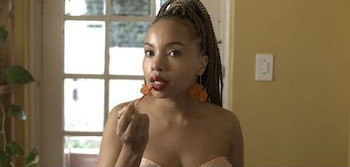The MTV Staying Alive Foundation recently partnered with Paramount Global and The Bill and Melinda Gates Foundation to produce In Bloom, a series of short films that address gender inequality. Each new short film has been released weekly, starting last month. While the initial release of the In Bloom series is on Paramount+ and Pluto TV, the films will soon be made available rights free to third party platforms to maximize reach and impact.
One of the films, KIFUNGO (“The Box”) is a psychological thriller with a truly intimidating catalyst for fear: HIV. The short film was written and directed by filmmaker Voline Ogutu, and the psychological thriller addresses the self-stigma that comes with an HIV diagnosis.
As a horror fan since childhood, I jumped at the chance to have a Q&A with Voline about what I loved most about her film, as well as what brought me to tears as someone living with HIV.

Director of KIFUNGO, Voline Ogutu, onset with Brenda Wairimu, who masterfully portrays HIV-positive Amina.
Hello Voline! Your short film, KIFUNGO (“The Box”), not only combines the real-life complexities of an HIV diagnosis with the horror movie genre, it does so quite effectively. As a HIV long-term survivor I have to know: what inspired you to create this very moving portrayal of a young woman, Amina, living with HIV?
Voline: The story was inspired by the boxes we put ourselves in as people living in a world where social expectations can mold how we see and feel about ourselves. While HIV is the focus, the message goes beyond that. Everyone has something that makes them feel like they are not worthy or good enough. While the first box is society, the second box is our own minds. The story is about making peace within ourselves. Accepting ourselves first. That’s how we are strong enough to face the world no matter what other people think.
One thing I loved most about KIFUNGO was the lack of jump scares. Many horror fans don’t mind them, but I tense up too much if I’m waiting for a spike in sound combined with a dramatic close-up or reveal. Was this a conscious decision?
Yes. Thank you. This was intentional. A lot of horror movies focus on what the characters are seeing; or not seeing. I wanted Kifungo to be about what the character was feeling. What most of us feel from time to time: rejection and loneliness. Which is scarier than any jump scares. The monsters that live with many of us in silence.
Ain’t that the truth.
I wasn’t expecting to cry, but the scene where Amina is confronting her own mortality in a conversation with what seems to be death itself... just, wow. It hit home and really took me back to some of the earliest days of my own HIV-related depression.
It means a lot that this film achieved this effect. Thank you for expressing this.
I also related to her clouds lifting. I remembered how the air felt fresher after I opened up about my status. I was finally comfortable in my own skin: HIV and all. For anyone out there that is struggling with a recent HIV diagnosis, what do you hope they’d get from Amina’s story?
The take away from Amina’s story is that you are not alone. Sometimes living in a society where one can be ostracized for being different can make you feel that way. But it is important to know there is still life beyond a HIV diagnosis. But the journey toward that life begins from within. It helps to have a support system, but ultimately, the voice in your head is the one voice you can’t escape. It’s not a voice that should be silenced or ignored. That herein lies a daily victory. When one can co-exist with themselves in harmony.








1 Comment
1 Comment